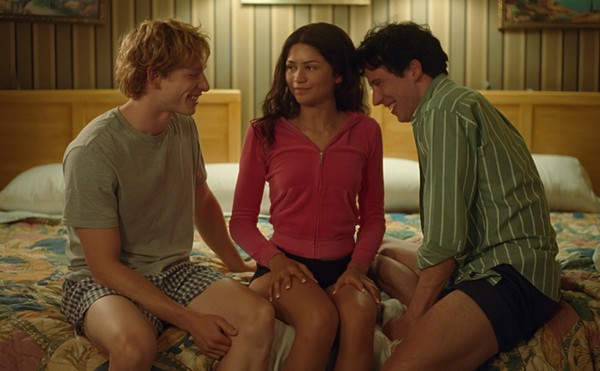For these reasons and more it is comforting and pleasant to behold the celebratory documentary Gigantic (A Tale of Two Johns), by newcomer A.J. Schnack (whose surname is quite fun to say aloud). Designed sort of like last year's movie about Wilco except with interesting people in it, this is a near-religious testimony to how splendid They Might Be Giants were pre-Flood, how they changed and morphed into a full band thereafter and how splendid they still are up to the recording of 2001's Mink Car and 2002's children's album, No! -- record companies be darned. Overall, the glowing appraisal seems fair. Browne's dusty dis out-bitters any cavils here (which are limited to the mildly malevolent blather of yet another insane person called Syd), but TMBG really do come across as much more than mere white male humans bearing a potential messianic complex illustrated in their "Kiss Me, Son of God."
They're both called John, you see, and that's only the start of this alleged facileness. Presented alphabetically, John Flansburgh is the glib guitarist in the plaid shirt, with the deceptively conservative haircut, scholarly specs and wicked licks. John Linnell is the campy keyboardist-accordionist who favors those stripey t-shirts popularized by Jonathan Richman and other kids from the '70s, topped with a foppish mop. Both men sing, more or less like Willie Nelson on coke -- if that's not redundant. In terms of pure imagination, it took two of them to equal one master songsmith like Robyn Hitchcock (whose Jonathan Demme-helmed Storefront Hitchcock would double-feature well with Gigantic), but considering the ghastly, witless state of contemporary American pop, their wry strivings are no less noble. Beck owes his career to TMBG, as does Eminem. Between Harry Nilsson's departure and the arrival of The Negro Problem -- basically during the worst storm of hoarse-ass grunge -- John and John were peerless in terms of both modern pop creativity and goony Caucasian fans.
The portrait delivered by Schnack (dig it: Schnnnnn-ack!) is well balanced to satisfy curious newcomers and the numerous TMBG faithful -- among whom we can count parodists Harry Shearer, Michael McKean and Janeane Garofolo, who show up individually to parrot TMBG lyrics like vintage poetry, which is starting to seem reasonable. The movie opens with former U.S. Senator Paul Simon telling an anecdote about Abraham Lincoln in order to segue into the Brooklyn-based Johns' hometown of Lincoln, Massachusetts. It ends with a solo from TMBG's bass player, who bears the unfortunate surname of Weinkauf. Yet despite these quirks, this isn't just a zany smirk-a-thon. Copious talking heads such as band manager Jamie Kitman, former Elektra A&R rep Sue Drew and large bald man Frank Black, appear repeatedly to concretize the concept that this duo stood as the "vanguard" of what was once accurately called "alternative" music.
Most revelatory -- and revel-worthy -- are the interviews conducted by Schnack (Would anyone care for a Schnack?) with the Johns themselves. From amusing memories of grade school through their nicely documented, pre-fame East Village experiments to their continued broad-band expansion, the guys are just as charming as one might expect. In fact, this critic phoned their LA hotel on their first buzz through Southern California years ago, and left a message. At 2 a.m., the Johns called back. They alternated bouncing on the bed and talking with a complete stranger for half an hour. That's a relatable band.
In addition to discovering the fascinating origins of TMBG's "Dial-a-Song" service plus copious whole and fragmented live performances of everything from "Ana Ng" to "The Guitar," the movie makes good on delivering the Johns as that rarest of entities: good friends who stay the course, who follow their bliss, who remain productive. Author and obvious lover-of-Johns Sarah Vowell pleads their case as squeaky-clean geek heartthrobs by explaining, "alcoholics sleeping with people they don't know -- that isn't a really attractive movement to me." It's also impressive that nowhere along the Johns' path have they attempted to conceal their scarcely closeted social resentment -- also a hallmark of Robyn Hitchcock's work. They emerge from this doc a band that truly wishes to love their culture and country, but are still struggling to figure out how and why.





